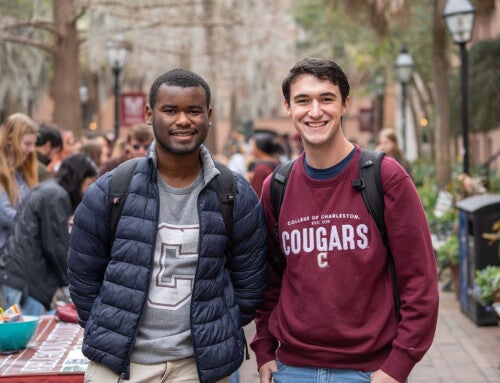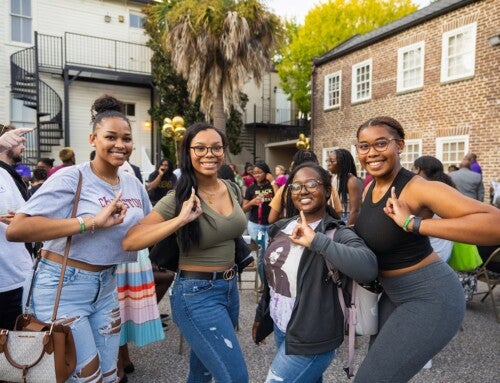A tiny virus can have myriad ramifications. Despite the overwhelming focus placed on the coronavirus and the COVID-19 pandemic, it’s hard to comprehend the many ways that this disease can impact the world. These are unprecedented times in modern history. But what’s not hard to understand is how this pandemic might offer lessons, particularly if it’s examined using a specific academic lens.
And that’s just what a number of the professors at the College of Charleston are doing. They’re using COVID-19 as an opportunity to help their students understand concepts across a wide array of disciplines from biology to business to public health.
Brian Bossak is a professor in the College’s Public Health Program. He’s teaching two different courses this semester – Introduction to Public Health and Epidemiology – and all the students in those classes have been required to make presentations about news items pertaining to the pandemic that are relevant to the respective course content.
“I have roughly 60 students in my epidemiology classes,” Bossak explains. “We’ve been discussing coronavirus since the first 59 cases were detected in Wuhan, China, back in early January. And each of these students has become intimately familiar with the developments and expansion of the disease from the very beginning, both from my input, and from classmates educating their peers. They’ve all been studying epidemic curves and epidemiological statistics, and they’ve learned to pull up real-time data in class and calculate case-fatality rates as the pandemic has progressed. At this point, all these students have the capacity to interpret epidemic curves, to assess whether the epidemic is growing more deadly or less so, and understand the public health concepts behind breaking the chain of transmission, such as quarantine and isolation.”
Aside from his classroom activity, Bossak recently served as a panelist at a coronavirus discussion on campus, which was jointly sponsored by Doctors Without Borders and the African Studies Club. A number of his students attended this standing-room-only event, and he says that much of what we’re seeing in the news today about COVID-19 was discussed there.
“It was reassuring to see so much interest and to hear such great questions from the audience,” Bossak says. “I think these non-credit educational experiences really provide an added value for the CofC community at-large.”
And Heather Fullerton, an assistant professor of biology, has been talking with the students in her microbiology class about COVID-19, and sharing insights with students in a fellow professor’s course as well.
“The discussion in my microbiology class,” Fullerton explains, “covered a wide range of topics and introduced those students to many methods that are being used by epidemiologists and public health officials to track the spread of this disease and its evolution worldwide. I took the time to discuss the biology behind viral evolution, immune recognition of pathogens and the structure of COVID-19. I also presented data from China about what segments of the population are hardest hit, and why hand washing and staying home is important to mitigate the spread of this disease.”
It was her departmental colleague, Courtney Murren, who invited Fullerton to speak to students in Murren’s 200-level ecology, conservation and biodiversity course. She says that Fullerton also shared some initial findings out of China as well as some of the mapping tools that are being used to track the spread of the pandemic.
“Since that late January discussion,” says Murren, “we’ve built on that initial information as the spread continued globally. I used this example to emphasize the topics of ecology (species interactions, migration, exponential growth) and evolution (mutation, phylogeny with genomic data) that are central to this course.”
Lancie Affonso, who teaches data science, management and entrepreneurship courses, has also been focusing on COVID-19 since January, using it to teach crisis management in his upper-level international management class.
“We’ve incorporated crisis management from the pandemic into the management and supply chain Global Challenge (CESIM) simulation that we’re using in the course,” he explains. “In addition, the students in my Honors College data visualization colloquium have been tracking the outbreak of COVID-19 and discussing the data visualizations used to demonstrate the spread of the virus, such as the map published and updated by Johns Hopkins University.”
Affonso adds that two students in the Honors class helped create custom crisis forecasting models used in that simulation for his international management course. Students in that class used the models specifically to evaluate the impact of the coronavirus on the supply chain for a global cellular phone manufacturer that has factories in China and the U.S. And this summer, Affonso will be teaching an online data analysis course in which he plans to use open educational resources to analyze the COVID-19 data sets obtained from the COVID Open Research Data Set, that was recently released by the White House and a coalition of leading research groups.
The COVID-19 experience can also help students truly understand the concept of globalization, says Christy Kollath-Cattano, who directs the Public Health Program.
“Things that occur in other parts of the world can and do impact their lives,” Kollath-Cattano says. “My global health students understand that, and they know it’s important to pay attention to what happens in the wider world.”
She adds that the pandemic “provides numerous opportunities for students to engage in critical thinking. They’re learning to think about the root causes and impacts of the pandemic, as well as how it is being portrayed by different entities, such as the news media, politicians and scientists. Inequality is a key concept here and students can consider what populations are being or will be more negatively impacted and why. All of that is based in critical thinking.”
Helping students understand the social impacts of the pandemic is what sociology professor Deborah Auriffeille has focused on. For her Introduction to Sociology class, she says she’s replacing some curriculum about economic stratification with a recent article about how the current pandemic is connected to and will exacerbate inequality. Auriffeille set up an online discussion board for her class where her students can connect material from their coursework to what they are learning about and/or experiencing with the pandemic.
And finally, another public health professor, Leslie Hart, has warned her students that the COVID-19 pandemic is quite possibly the most disruptive event they will experience in their lives. But, she also told them that it presents a formative opportunity for them.
In an email to those students, Hart wrote: “As a public health student at the College, you have been trained to seek and pay attention to evidence-based information. You have learned about transmission pathways, and you’ve engaged in discussions about appropriate intervention measures to stop the spread of infectious diseases. And in our current class, you are learning how important data and statistics are for making informed decisions to protect our public health.
“Given all that,” she continued, “I hope that you are serving as your family and friends’ translator for the deluge of information coming at us 24/7. I hope you are helping interpret the statistics and providing guidance on the best ways to prevent transmission. I hope you are emphasizing the importance of social distancing and necessity for quarantine/isolation. And I hope you are able to tell everyone that we have to work together to protect our own public health. This is your time to shine.”
Photo by Anna Shvets from Pexels




